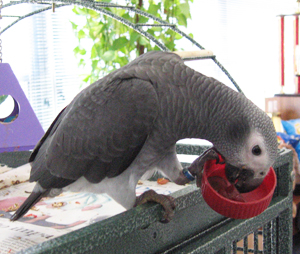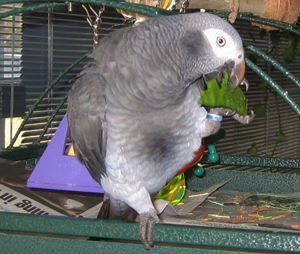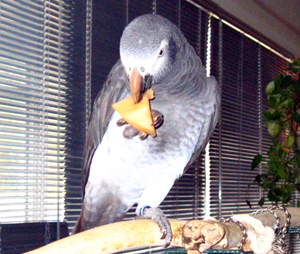African Grey Diet and Nutrition
A variety of foods is important to providing the diet and nutrition that your African Grey Parrot needs to have a happy and healthy life. There are many differing opinions and thoughts on African Grey diet and nutrition and there is no exact formula for feeding your companion parrot. Provide the most balanced diet for your African Grey as possible.

An African Grey's Diet is important for a long and healthy life
As a base, a pelleted diet is the best way to go for your African Grey. Preferably, an organically processed pellet, and not one that has additives, such as artificial coloring and flavoring. Seeds are high in fat and are not considered a healthy diet for your African Grey Parrot. Do not give vitamin supplements to your African Grey without talking to your avian veterinarian. Most African Greys on a pelleted diet do not need them.
Provide an assortment of fresh, wholesome, organic vegetables. As with any child, sometimes it can be a challenge to get them to eat their veggies so you might have to spend some time encouraging your African Grey Parrot to eat them. Some vegetables contain more nutrients needed for your bird than others.
Good vegetables choices for your African Grey:
 Fresh vegetables are an important addition to your African Greys diet.
Fresh vegetables are an important addition to your African Greys diet.
- Sweet potatoes
- Carrots
- Yellow and Butternut squashes
- Collard greens
- Broccoli (good source of calcium)
- Kale (also a good source of calcium)
- Peppers – green, red, chili
- Celery
- Zucchini
- Cucumbers
- Green beans
- Peas – garden and snow
- Leaf lettuce (not head or iceberg lettuce)
Good fruit choices for your African Grey:
 Fresh fruits given daily add nutrition to your African Greys diet.
Fresh fruits given daily add nutrition to your African Greys diet.
- Melons
- Kiwi
- Apples
- Mango and Papaya (with skins removed)
- Grapes
- Oranges
- Berries – blueberries, blackberries, raspberries, strawberries
A common deficiency found in an African Grey's diet is Vitamin A or beta-carotene, so it is important to provide beta-carotene vegetables on a daily basis. Calcium is also extremely important, as it is the predominant mineral in bird's bodies. It is essential for healthy bones, nerve and heart function, muscle contraction and blood clotting. An avian veterinarian should check your African Grey yearly for calcium levels.
Water is a very important part of your African Grey's care. Make sure they have fresh water in a clean bowl on a daily basis. If you question the water quality, give them bottled spring water – never distilled water as that has all the minerals and nutrients taken away.
As the bird owner, you have the control over what your Grey is fed to help ensure that you are doing the best you can to help them live a long, disease-free life. Use good common sense, don't hesitate to talk to your avian vet, and you will achieve the balance that your African Grey Parrot needs to provide them with a balanced and nutritious diet.
